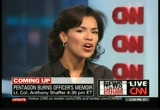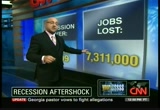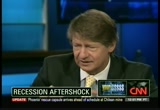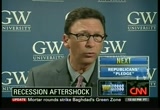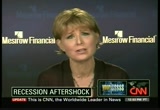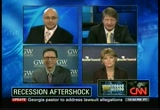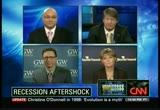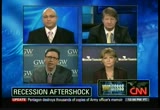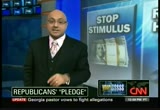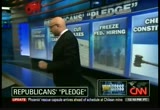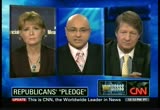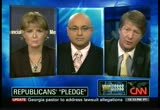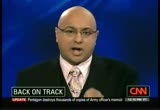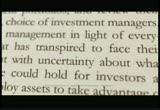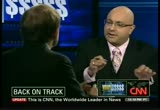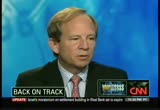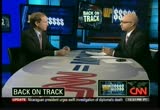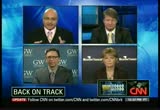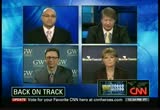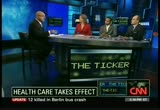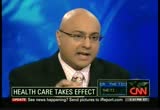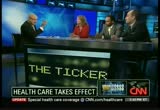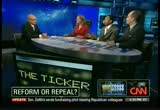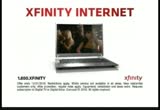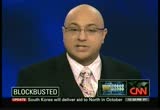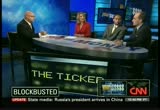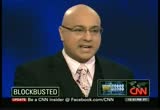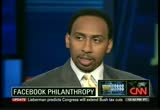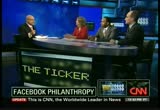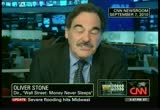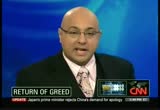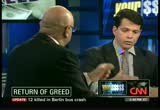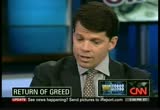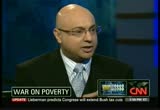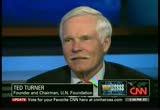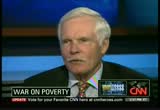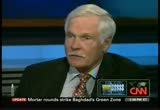tv Your Money CNN September 26, 2010 3:00pm-4:00pm EDT
3:00 pm
all right. army reserve officer's tell all book aboutis duty in afghanistan is causing quite the sensation to the tune of the pentagon buying up nearly 10,000 copies of it and then burning the copies. the pentagon says the book threatens national security. we'll hear what the author has to say about all of this 4:30 eastern time right here in the "cnn newsroom." and now cnn looks at your financial bottom line on "your $$$$$." > the great recession is finally over. where are the jobs? i'm ali velshi and this is "your $$$$$." christine romans is back. the great depression came to an end in june 2009, that is according to the national bureau of economic research. they are the people who actually make these decisions. they say it's over and they take their time making that decision, as you can see. now, the recession claimed more than 7.3 million jobs.
3:01 pm
since the recession has ended, however, the economy has lost another 329,000 jobs. that's net. that's what we've gained minus what we've lost. we're still down another 329,000. the road ahead, the economists are projecting unemployment in the united states currently at 9.6% will remain around 9% through the end of next year, 2011. in fact, we probably won't get to that 5% we were at before the recession started until 2013, 2014. let's bring in the author of "don't vote, it just encourages the bastards." good to see you. welcome to the show. >> thank you. >> the recession was over a long time ago. don't you feel better when you found out it ended in june of 2009? >> why didn't i feel better back when it was over, when they told me it was over. >> did you feel better when they told you it was over 15 months ago? >> no. >> the problem is this. it's the jobs.
3:02 pm
>> of course it's the jobs. it's all about how people feel about the economy. there's a psychological aspect people at the national bureau of pulling fingers out of your hat are not aware of. if you ain't got a job, the recession is still on. >> very good. frank is the director of school of media and public affairs at george washington university. a former colleague of mine here at cnn. our washington bureau chief. frank, even warren buffett chimed in this week saying by his definition the recession isn't over and won't be for a while. politically this is a tricky one for the president, for the democrats heading into a midterm election. boy, wouldn't you love to claim victory saying after we got into office the recession ended. i think if anybody tried to say anything like that in politics, they would seem more out of touch than normal. >> can't do it. you can't say it from the white house. you can't say it from capitol hill, can't say it from the state house because you'll call people on the carpet. people who live this will call you on the carpet.
3:03 pm
the recession is over. are you employed? is your kid employed? is your house worth more than it was? how is your 401(k) doing, your house, right on down the line. politically this is the third rail. george bush i had the problem. remember the scanner incident that didn't happen. there was so much of that stuff back then. it was like, well, the president is out of touch. doesn't he realize what we're suffering through? the statistics are way ahead of what people are actually feeling. in this case as we pointed out maybe years ahead. >> right. interesting point. statics way ahead. we've got the political argument. let's go to our economist, chief economist for -- i've seen statistics that indicate we are in an upswing. >> we're technically in a recovery but it's a game of semantics. when you're coming out of incredible losses, we've been there before but not such a deep level.
3:04 pm
we're trying to crawl out of this deep hole. of course it's painful. it does seem rather trite to say it's over when there's so much pain. it doesn't provide solace for all those employees looking for a job. many of them lost their jobs during the height of the crisis in 2008 and 2009, the beginning of 2009. they have been unemployed for a very long time now. what we really worry about is how are people going to reenter the labor force when jobs do pick up which none of us are holding our breath on right now. >> p.j. o'rourke, you specialize in satire, some is advice. what are you calling yourself a conservative or libertarian. >> i still call myself a republican. i'm a republican because republicans have fewer ideas. >> as a republican, what does this administration have to do? what is in their arsenal? what can president obama do, what can democrats do right now to address what all four of us
3:05 pm
agree is the primary reason why we don't all feel we're in a recovery and that is that we don't have enough private sector job creation in this economy. >> they should probably quit having ideas, too. this would be the perfect moment to knock it off with the wonderful ideas. one of the worst ideas they have had, among many, was the stimulus. not the bailout so much but the stimulus. my ex-congressman, who hopes to be my congressman again, charlie bass from the second district in new hampshire said to me, said, p.j. you realize the stimulus is costing us $10 billion -- within $10 billion of what it would cost to have a one-year personal and corporate tax holiday, no federal income tax for any corporation or people for one year, be about the same price. now, that would have been a stimulus. if they would get out of this wonderful sort of central planning mind-set they seem to
3:06 pm
have inherited from 1930s and get back to being just plain old stupid politicians, they might have one leg up. >> frank, the bumper stickers are out there, government, get out of my business. that's a sentiment the tea party has very successfully capitalized on in this midterm election. the bottom line is that's a problem for the democrats. >> look, it sells. it sells because people are angry and they have to have something to blame. we have a proud tradition going back to when we had a king across the ocean of blaming people in power. when the economy is bad, your taxes go up, it's salient. this is baked into our dna. here is the democrat's real problem, obama's real problem, among the 20 other real problems he's got. you don't get credit for what doesn't happen. he's not going to get credit for the people that didn't get thrown out if, in fact, the stimulus, despite what p.j. said saved any jobs. he's not going to get credit for the auto industry that didn't disappear because the bailout was there as unpopular as it is.
3:07 pm
it doesn't work that way. put that on a bumper sticker. >> diane and frank, stay there. i have something for you. the republicans actually have a plan. it might sound like politics heading into the midterms, is it going to be policy if they win? we're going to break it down with m.j., frank and diane when we come back.
3:08 pm
guarantee me the best deal on my refinance loan, or pay me $1,000? that would be nice, not getting swindled. um...where are we? don't just think about it. put lendingtree to the test. get the best deal, or $1,000. hey what's going on? doing the shipping. man, it would be a lot easier if we didn't have to weigh 'em all. if those boxes are under 70 lbs. you don't have to weigh 'em. with these priority mail flat rate boxes from the postal service, if it fits, it ships anywhere in the country for a low flat rate. no weigh? nope. no way. yeah. no weigh? sure. no way! uh-uh. no way. yes way, no weigh. priority mail flat rate box shipping starts at $4.95, only from the postal service.
3:09 pm
a simpler way to ship. ever wish you knew a retirement expert? let's meet some. retirement's a journey and, we know the territory. we're chartered retirement planning counselors at td ameritrade. we're trained. we're seasoned. experienced. we'll help you with rollovers. consolidating old accounts. opening new ones. guiding you through paperwork. we're like retirement co-pilots. call us soon. when you're ready, we're here. time for fresh thinking. time for td ameritrade. when allergies make them itch, don't wait for your pills to kick in. choose alaway, from the eye health experts at bausch & lomb. it works in minutes and up to 12 hours. bausch & lomb alaway. because it's not just your allergies, it's your eyes. >> the republicans have unveiled what they call a pledge to america.
3:10 pm
they would like you to think it's similar to the 1994 contract with america. in some ways it is, in some ways it isn't. let's take a look at it. the first thing they say they are going to do if they get elected is stop the stimulus. any stimulus money that has not gone out the door will not be spent. number two, repeal health care reform. it was signed into law about six months ago. some of the provisions have just started to go into effect. the republicans are now taking the official position they will repeal it. this is entirely new, a number of republicans have already said they will do that. number three, they want to extend those 2001 and 2003 tax cuts due to expire at the end of the year. as you know, that's under discussion, whether to extend them for everybody or for middle class americans or for nobody at all. there are also some business tax cuts included in the republicans' plan. number four, freeze all hiring except that which is related to national security or otherwise keeping americans safe. and number five, they want all laws passed by congress to go through a constitution check,
3:11 pm
although that is kind of what the supreme court does. let's have this discussion with p.j. o'rourke again and diane, who joins us from chicago. first of all, diane, i'm going to ask you, is this a situation, is there enough meat in this proposal by the republicans to actually have some sense of how it's going to affect the economy? >> well, there's some things i guess we could look at. my own view is high income tax cuts to extend them now, although i wasn't in favor of them initially because of the deficit producing characteristics they have now, it's just too dangerous to do it because of the extortions they cause to financial markets and investors in financial markets for a year to extend them. my own view is we really need to regroup and rethink the entire tax code, simplify it, eliminate a lot of deductions and tax rates. that's a very different kind of rhetoric than we're hearing. we're just hearing a lot of
3:12 pm
bouncing around about what are the ideas already out there. i don't hear a lot of new ideas out there about how to deal with the deficit. the deficit, the elephant in the room is medicare and medicaid. nobody is talking about that right now. i think these are much more important issues to have to reframe the debate from politics, ideology and fiction and get back to the facts. >> that's what we enjoy doing on this show. john boehner says he is on the side of business. listen to how he said it. >> i am the business community. that's who i am. the heart and soul of me. when i see government, like i did as a small employer, choke the goose that's laying the golden egg, that's what drove me here, to fight for a government that allows the american people in the private sector to be the engine of opportunity for all americans. >> okay. so there's a couple issues here. one is that we know that jobs are the major issue confronting americans right now. historically small businesses in america have been the engine of job creation.
3:13 pm
i guess, is that what he's referring to when he says the government is strangling the goose that lays the golden egg? how exactly is government holding back business? >> well, this health care reform thing is going to be a huge burden on small businesses. increased taxes on supposedly rich people, who are the people who run those businesses. that's going to be a huge burden. but, you know, back to what -- the world's most attractive economist had to say earlier, it is the entitlement programs, the real -- the republican contract with america, the pledge to america, i say this as a republican, this is bologna. the core problem here is entitlements. when you start messing with entitlements, you are playing in traffic. you are playing in traffic with a blindfold on. it's probably the one thing i really have to say in favor of the tea party people. if you like some of these tea party people, they may be
3:14 pm
suicidal enough to go play in traffic and try and do something about those entitlement programs. whether it will work or not, i don't know. >> let's talk about this, diane. the president has got two commissions going at the moment, who are supposed to report in december about how to deal with the deficit. obviously you cannot -- the debt, the national debt. you can't deal with the debt or deficit in our environment without having to deal with entitlements. >> absolutely. >> you can't fix enough of it. do you think someone is going to have the courage to actually, as p.j. says, go and play in traffic and start dealing with the things that will actually get our economy back on track? >> it's interesting. i just spoke with people on the commission. behind doors they say both sides talk like grown-ups. they seem to grow up the minute the doors are closed and they are not talking as politicians. they are, many republicans in office that are going to have to
3:15 pm
deal with this are worried about the fact they have to come up with some answers on the issues and these tough decisions they have to make. that said, i tell you, i'm not hopeful about what's going to happen. i think the grownups are the ones that are going to continue to talk grown-up and those are not running for election and having a side commission they are going to report before the bipartisan commission comes out. that said, there's about six months between december and june before we get into 2012 politicking and running for the 2012 election. that only gives us six months to think about long-term plans, five, ten-year plans, long-term plans on restructuring the elephant in the room, entitlements and tax structure. i don't think we're going to get there and that's disappointing. i do think social security will be dealt with by the end of the year by raising the age, that's the low hanging fruit, to keep social security solvent for the majority of americans. >> about a year, year and a half ago we were really worried about the future of the u.s. auto
3:16 pm
industry. in a minute, i'm going to talk to the guy president obama put right into the middle of the mess to try and save it. we'll see what he has to say about how the government went about saving the auto industry when i come back. everything you need to stretch out on long trips. residence inn. ♪ everything you need to stay balanced on long trips. residence inn. can be unsettling. but what if there were a different story? of one financial company that grew stronger through the crisis. when some lost their way, this company led the way. by protecting clients and turning uncertainty into confidence.
3:17 pm
what if that story were true? it is. ♪ ♪ but i really love my bank ♪ i hate-- didn't quite catch that last bit. i said i really love my bank. right... is there a problem ? it's not really raging, man. uh, we were hoping for more raging ? well, you said write from the heart. yeah... don't do that. at ally, you'll love our online savings account. named the best of 2010 by money magazine. ally. do you love your bank ?
3:19 pm
personal pricing now on brakes. tell us what you want to pay. we do our best to make that work. deal! my money. my choice. my meineke. stephen ratner was basically plucked from the world of finance and put in charge of the automotive task force back in 2008. his assignment, save it the u.s. auto industry from collapse. back then, that felt like a very real possibility. he's the author of a new book called "overhaul" an insiders account of the obama administration's emergency rescue of the auto industry. he's with me. steve, in one word, was the u.s. auto industry, as we reported it was, as we were told it was, was it on the brink of destruction? >> absolutely. >> it was really that close? because we were warned by ford if gm goes down it could take down suppliers which could then
3:20 pm
have a connecting affect to the other automakers. >> without the government's intervention, gm and chrysler would have run out of money in early 2009 and would have closed their doors and liquidated and a million people would have been out of work. ford would have shut down too because suppliers wouldn't have been available. >> they weren't the company on the brink but he was making a strong argument. what surprised you most when president obama asked you to take over and went in and had a good insiders look. what shocked you the most? >> the state of general motors. i've been in business 25 years. been an investment banker, spent a lot of times around companies. i'm not sure i've seen a major company as dysfunctional, as poorly managed as bureaucratic at general motors. >> what was the president's response when you came back to report how dire things were in the auto industry, what were his thoughts? what did he have to say either directly to you or others who
3:21 pm
reported it to you? >> the president had been aware of this for some time. he was briefed on it right after the election. i have a scene in my book which i wasn't present for but from my reporting, he basically like everyone else couldn't understand how they had gotten into a mess like this. he said, why can't they build a corolla? we said, we don't know. the team was all new. the team there was new. it's a mystery how they could go off the cliff so quickly and dramatically. the president stepped up. he knew he couldn't walk away from this. it was his problem. he made the right decisions. >> what is going to happen to these companies now? are they on the correct footing? tell me separately about ford, gm and chrysler. >> ford, as we discussed, has gotten through this in good shape. they are making good profits. always things to you. ford we certainly don't need to worry about. gm and chrysler, fundamentally restructured, cut their debt, closed plants, which was painful, but had to happen, changed management. i think both companies have a good shot, very good shot at
3:22 pm
succeeding. they have an opposite set of issues to concentrate or resolve. gm has to solve management problems, everything we talked about. with dan's arrival that's another positive step and i feel good about it. they have had profits two months in a row, holding market share and they have good products equally importantly. chrysler has terrific management. chrysler's cupboard was bare in term of new products. with chrysler what we have to see is how the new products that came out later this year will sell and that will determine whether chrysler is a great success or not. i feel good about both. >> thanks for your good work. author of "overhaul" former head of the president's task force. let me go to frank sesno to ask him first. this is a book about what happened with respect to the auto industry. there have been books that come out about what happened behind closed doors with the bailout. we're now looking at this panic-stricken time in our
3:23 pm
history, in a rearview mirror, thank god for that. do you think after looking at this and listening to steven ratner the government did the right thing with respect to the auto industry. >> i do. when you look at what the alternative is, which is to have lost the companies, the ripple effect and impact on economies and the fact these companies needed a life line in a desperate moment, this in the end, i think, will prove to be a wise move. i think one of the interesting things ratner is saying and i've climbed into some of these cars, some years in my career i did a deep dive into the auto industry, spent a lot of time in detroit and elsewhere. the key issue is the products have been lousy. we're starting to see, this is what is interesting to me, and i'll be watching closely, we're seeing competitive interesting products out of detroit. general motors is leading the way. the buick division, which would have been your great grandpa's car a few years ago is doing some things. it's the hottest brand in china.
3:24 pm
can general motors become a global leader again? it's a very tall hill to climb. they have got very interesting products they are developing globally. they were at that same point the homeowner is when they are about to lose their home. do you want a life line then? it was an expensive life line, big gamble, i hope they pay off. >> p.j. o'rourke, you're the son of an auto salesman. >> four generations have been in the car business. i don't see any place for government in this kind of -- >> do you believe what he said, there was a chance those companies could have gone under. >> we do a little thought experiment on that. do we really believe those companies had so little value there wasn't enough international capital out there to get involved. >> chrysler said they couldn't sell it for a dollar. >> well, they may be right and that may have been about what it's worth. why are we the taxpayers keeping
3:25 pm
something alive they couldn't sell for a dollar. you know capitalism isn't important because capitalism succeeds. it's a wonderful aspect of capitalism that succeeds. what's important about capitalism is it fails. you want to know what happens to a bad idea like some of our entitlement programs with government, it gets better. what happens with a bad idea when it's free market, it disappears. it goes away. it goes the way of bell bottoms or whatever. >> what p.j. is saying is a sentiment not just about the auto sector but a lot of things taxpayer money was used for over the last few years. in hindsight, what do you think about the degree we had government involvement and taxpayer involvement in the auto sector and the larger bailout. >> you know, i guess as daughter of detroit myself, i have to admit, also university of chicago graduate, i have this
3:26 pm
sort of split personal, sometimes schizophrenic on my views on the economy. i think it's important to point out we didn't have a market. we didn't have a market in much of the 2000s, we had incentives, which incened ted fraud. the markets weren't clearing. after that we had a panic which meant markets didn't clear at all. going back and judging and saying it was like normal times when gm maybe should have been let to go, it was not normal times. although i have mixed feelings about gm, at the end of the day i have auto suppliers that are clients of mine now that are running three production shifts six days a week, looking to maybe turn the key on idol capacity and hire up another whole production facility. that tipping point is one of the few bright spots in the u.s. economy today. i think it was necessary. i think the bailouts were necessary at the time given the
3:27 pm
height of the panic. it was the interventions that averted another great depression. i know it's not easy to deal with. i'm with ben bernanke and i side with him. >> good discussion from you all. a pleasure to see you. diane swonk. p.j. o'rourke, the author of "don't vote, it just encourages the bastards. waebl right back after all this.
3:30 pm
a big welcome back to my partner in crime. christine romans, congratulations on the new addition to your family. also joined by radio talk show host stephen smith and managing editor of cnnmoney.com, which is the source of so much great reporting on business and should be the source of so much of yours. this week marks the sixth anniversary, the six-month anniversary, half a year anniversary, of health care reform. some big changes to your health insurance came into effect this past week.
3:31 pm
here is a breakdown of changes you'll see. number one, insurance coverage is expanded for adult dependents up to the age of 26. children up to the age of 19 no longer denied coverage for pre-existing conditions. all new plans must cover preventive services like mammograms, colonoscopies for free. insurers are prohibited from rescinding coverage. and forget the politics, christine, are we on the right track with health care. >> it is the law of the land, alli. a lot of conservatives say you're not on the right track and will use it politically trying to repeal this. this is the law of the land. you have people writing rules as we speak. how we receive health care in this country, these things take a long time. this weekend is when some of the provisions go into effect. >> a little nerdy for a second.
3:32 pm
we have studied this a great deal. i've heard people say it's going to cost a lot more for small business and individuals. we do not know that and will not know that for some time. >> we do not know. projections are it's going to be five years before you see the cost savings they have been promising. to be fair this past year we had a 14% increase in health cost. it's not like things are so great. >> here is the difference, you guys are the experts and i disagree with both of you. we do know. let me tell you why we know. it's the government we're talking about. any time the government is running something usually ends up costing a hell of a lot more than they indicated. >> do you think insurance companies are being fair with americans? >> no, definitely not. there needed to be modifications, things needed to be addressed, it all sounds good. once you take the red tape into account, once you take into account it's the government involved with making sure things are running appropriately, the fact is it always ends up
3:33 pm
costing more. >> those that don't like it, 49% of americans disapprove with the new health care law. now, some of those people disprove of it because they didn't think it went far enough, some think it went too far. republicans by the way as part of their new pledge are pledging to repeal the new health care law if they win control of congress. republicans pledge to america, that's what their program is called, would roll back the six-month health care reform. what happens then, stephen? >> what happens, they repeal it, bottom line they are in bed with insurers and because they're in bed with the insurers, you'll have people that side with them because they are emphatically against democrats and against the administration. they don't believe they know what they are doing because they are more concerned about the economy than anything else. if the republicans in an effort to repeal health care legislation are of the mind-set by doing so we're going to facilitate job creation, then the american people will by and large solve it.
3:34 pm
that's the panic button for the american people. when jobs are not addressed everything goes haywire. >> you want to appeal to that for the midterm elections. do you want your opponent to come out and say, okay, john so-and-so wants to make pre-existing conditions for children legal again. he wants a kid with lymphoma to not be covered. >> this is a hard bet for anybody in this election. republicans have to be careful about how they approach it. that 49% of people that are against it is a split between people who think they went too far and didn't go far enough. cut it anyway you want. >> it's too complicated. a lot of people don't understand it. you can be for sick kids but against long-term deficits. >> and worried about bureaucracy. online gambling, illegal in the united states. should it be? next talk about why the sin tax could actually do a whole lot of good.
3:35 pm
everything you need to stretch out on long trips. residence inn. ♪ everything you need to stay balanced on long trips. residence inn. i really didn't see it coming. i didn't realize i was drifting into the other lane. [ kim ] i was literally falling asleep at the wheel. it got my attention, telling me that i wasn't paying attention.
3:36 pm
i had no idea the guy in front of me had stopped short. but my car did. my car did. thankfully, my mercedes did. [ male announcer ] a world you can't predict... demands a car you can trust. the e-class. see your authorized mercedes-benz dealer for exceptional offers through mercedes-benz financial. ♪
3:38 pm
welcome back to "your $$$$$." congress could soon vote to legalize online gambling. with the government scrambling for cash, the commission estimates legalizing online gambling could bring in over $40 billion in tax revenue over the next decade. online gambling has been illegal since 2006, which, by the way, always confuses me. i feel like people can gamble online. first of all, can people gamble online without it being illegal? secondly, is this the way to go. >> bottom line is this, i completely support it, absolutely. i propose marijuana should be legalized. i don't gamble or smoke weed. i think they should be legal. anything, when you've got a $14 trillion deficit and counting.
3:39 pm
>> take the money where you can get it. >> take the money where you get it. find a way to legalize it and tax it and at the same time sort of dissuade people from doing it, why not. >> what do we pay as a society for people who lose productivity, i don't know, i'm just throwing that out there. >> i lost productivity to online gambling. i want them to change the rule about how to deduct losses on winnings. >> you pay taxes on winnings. >> then they kind of -- i come out on the wrong side of that. >> if you have a computer mouse, can't you go to one of the online gaming services in the caribbean? >> people can do it. if people can do it elsewhere, kind of like marijuana, people who want it seem to be able to get it. very interesting. >> if you can profit off of it, why not? it's the american way. it's the american way. >> traditional gambling companies like harrah's entertainment and mgm mirage have had an unlucky couple of years, legalizing online
3:40 pm
gambling could put them at additional financial risk. the changes don't stop there. here's another one for you. blockbuster filed for chapter 11 bankruptcy earlier this week in an attempt to overcome a billion in debt. to help solve the debt problem the company began shutting down a third of u.s. stores last year. last year. 2009 they decided to shut down those massive video warehouses. >> too late. >> when i can get dvds by mail, download them, get them in boxes in supermarkets. i can get them zapped to my head if i want. >> downloaded through your ear. >> blockbuster is remarkable. >> part was a debt problem spin off from viacom. part was a business model with all of these new kinds of ways we can get entertainment. part of it is when was the last time any of us used a product from blockbuster. at least 10 years for me. >> it never made itself a better alternative to netflix. >> i didn't even know
3:41 pm
blockbuster was still around. i don't have a dvd player i use the cable -- >> just do video on demand. >> blu-ray. >> that's what netflix and others have to worry about. there's going to be more competition. >> you say unbelievable. i'd use another world, pathetic. the fact of the matter blockbuster could have owned this business. it was theirs. for me, i knew it was done for them when i preferred going to best buy than blockbuster, it's really that simple. you can go in there and get a plethora of other things as opposed to just movies. blockbuster never adapted to the times, never embraced the challenges staring them dead in their face. they just sat back and thought they could rest on their laurels because they were blockbuster, the place to go for movies. >> it was an '80s, '90s experience. you went out. everybody walked around. picked your movies. bought candy and left. that's not how we get entertainment.
3:42 pm
log on, download it, get it. we'll see, bankruptcy protection, maybe they emerge with a better model. mark zuckerberg, ceo of facebook, he's giving $100 million back. the social networking guru donated $100 million this week to the troubled school district of newark, new jersey across the river here. the donation comes just a week ahead of the release of the movie "the social network" which does not depict zuckerberg favorably. is this a good deed or good pr? >> both. he has a lot of money. he's one of the youngest billionaires in history. he's got to start thinking about how to spend that money in a way that will live on beyond him and beyond what he did for facebook. if i were counseling him, and i'm not but for a low, low price i can, education is the way he should go. focus on fixing troubled aspects of education.
3:43 pm
>> let's break this down. he's 26 years old. he's worth approximately $1.6 billion. not only does he give it to a city like newark, in desperate need, they spend $20,000 per student, about 40,000 students in that area. you're talking about $900,000. this guy is donating $100 million and giving it to somebody like cory booker, the mayor, not only is he going to do something with it, he's elevating in popularity. you don't know whether he's going to be a governor or run for president some day. but not only that he's giving the money but how it's going to be used. it's smart. >> doesn't care if it's good pr, it's going to help. >> he's a kid. people made fun of him say he's socially inept. he's built great company. he's doing good things with the money. i don't see a problem. >> he's got big shoes to fill. >> there are reports he wanted to wait until after the movie anyway, we don't know the real
3:44 pm
story. we're so focused on public education that if somebody wants to give $100 million to public education, you know what -- >> god bless them. >> up to newark to do the right things and get results. >> cory booker is proving to be a good leader of that city. christine, i have a confession. you were away and i cheated on you, only in the movies. i'm going to come out with all the dirty details, including the other anchor next. [ technician ] are you busy? management just sent over these new technical manuals. they need you to translate them into portuguese. by tomorrow. [ male announcer ] ducati knows it's better for xerox to manage their global publications. so they can focus on building amazing bikes. with xerox, you're ready for real business. sure, but do we speak hybrid?g amazing bikes. yes, we do.
3:45 pm
and we can say over 700 miles on a single tank and 41 mpg city, and all the words stick because they're true. we speak the most fuel-efficient midsize sedan in america. yes, we speak hybrid, and apparently quite well. fusion is now the 2010 motor trend car of the year. get in... and drive one. to save me a boatload of money on my mortgage -- that would be awesome! [sarcastically] sure. like that will happen. don't just think about it. spend 10 minutes at lendingtree and save up to $272 a month.
3:46 pm
[ gorilla ] nice move. but can your retirement income keep pace with changing interest rates? this variable annuity from axa equitable has an option that can help your retirement income move with changing interest rates. but what do i know? i'm just the 800-pound gorilla in the room. [ female announcer ] make the retirement cornerstone annuity from axa equitable part of your retirement plan. consider the charges, risks, expenses and investment objectives before purchasing a variable annuity. contact a financial professional for a prospectus containing this information. read it carefully. whoo hoo!
3:47 pm
okay. it's been two years since we were right in the middle of the financial crisis, really the worst of it. this was the crisis hitting wall street. this was the crisis hitting credit markets around the world. deals couldn't be made. part of the problem was this was the precursor to all the pain we felt later. that active time two years ago is captured very effectively by oliver stone, a four-time academy award winner in his new movie, wall street never sleeps. oliver invited me to be with someone. i talked to oliver stone and he explained why. >> i'm glad i put you with a guy that runs a hedge fund.
3:48 pm
he's got a point. he takes the hard line. he says let it go. let the banks go. >> obviously that discussion continues to this day. should we have let the banks fail back then or did the government do the right thing by stepping in after the failure of lehman brothers. here's a scene from the movie. >> potentially at a point where we might actually lose the financial system as we know it? >> if the government doesn't get involved there is a risk of a global meltdown of the global financial system. >> this is a financial crisis and anyone who doesn't admit that is just kidding themselves. >> i disagree. you've got to get the government to say no in a situation like this. true capitalism is about disaster and correction. it's the natural cycle. without it, all kinds of artificial anomalies. >> if you keep your eyes off carey mulligan and shia labeouf, you hear me. anthony is founder and managing partner. he served as a technical adviser
3:49 pm
to the movie "wall street: money never sleeps." he plays a panelist in the movie. he's the author of a new book called "good-bye gordon gekko" with his views on what happened during that time. anthony, welcome. good to see you, my friend. >> good to see you. >> let's talk about this for a second. you and i played roles in that movie. mine was sort of a consensus view out there, we've got to get in, we've got to save these banks. only the government is big enough to save it. yours was a view others were taking at the time. no, it's not the government's job to save these banks. >> there's a scene that oliver cut. i don't know if you remember this. you've got a fire in your living room. don't you want to put the fire out? the curtains are on fire. i turned and said you're going to give gasoline to the arsonist that set the fire. that's one of the things that happened here. the whole theme of the movie was moral hazard. the banks were reckless.
3:50 pm
>> moral hazard meaning you do something wrong and someone rescues you and bails you out so you don't learn the lesson. >> you take risk with the understanding you're too big to fail. if you take that mental risk you create profits and that's really good for you, it's sort of a heads i win, tails you lose sort of scenario. >> think you're setting up, despite all the rhetoric, you're setting up for some positive growth and quarter-to-quarter consecutive gdp gains. these companies are lean and mean. their utilizations are down. capacity is tight. okay? you've got $2 trillion of cash on the s&p balance sheet. it has to be deployed. >> which means companies. companies have this kind of cash. >> companies have cash. >> but they're not deploying -- by deploying it, we want to see them buying companies, hiring. we've seen acquisitions, but we haven't seen hiring which is going to turn this economy around. >> because there's a lack of clarity in our current government structure. this is not a partisan argument. this is a bipartisan powe
3:51 pm
polenic. there's taxes, forward regulation. everybody is frozen and not hiring because of that. >> good to see you. it was good to make my movie debut with you. >> you look great in the movie. he's also got a scene where he's blabbing on the phone. very good close-up of ali. >> i don't know how good it is. good to see you, my friend. >> good to see you. >> his new book, "good-bye, gordon gekko." ted turner is the founder of cnn, but he's not talking about tv. he's focusing on a much bigger cause. ted turner here to talk about it next.
3:55 pm
this is a real treat for me. i hope it is for you, too. you may know ted turner as the founder of cnn, but there is also another establishment near to him, the united nations foundation. it was created by turner in 1998. it was a public charity set up to support the u.n.'s causes. and this week marked the tenth anniversary of the u.n.'s millennium development goals. it's basically a to-do list for all 192 member states all with a simple mission that starts with ending poverty. so how have they held up the deal on their end? here's more on that and more on ted turner joining me now. ted, first of all, welcome back to cnn. it's always a pleasure to have you around. >> it's nice to be here. >> ted, you committed yourself in a very significant way. you gave away, what was it, a 30-year fortune you committed at
3:56 pm
the time. a third of what was in your fortune to getting things on track with the u.n. because you felt that some people, some organizations like the united states, were not holding up their end. so you committed $1 billion to the united nations foundation. you founded this organization. what has it done so far? >> well, it's done a lot of good. most of that money has gone out to different programs that are endorsed by the u.n. and the united states has paid its dues pretty much ever since then. it's up to date. and the u.n. is able to meet its obligations. that's one reason i did it was to call attention to the fact that the u.s. wasn't paying the dues, and i was going to try and make up for it. >> you actually wanted to pay those dues for the u.n. >> yeah. my original idea was to just donate the $1 billion directly to the u.n. but the u.n. at that time was not set up to take donations. it could only get money from
3:57 pm
sovereign states. now it can get money. but they changed the rules. but then they couldn't take a donation. from an individual. >> since you did that, there's been a bit of a move with the gates family, with warren buffett, toward people who are very wealthy, solving some of the problems that we used to think of as problems that should be solved by nongovernmental organizations or governments. >> governments. >> and there's been the shift. melinda gates earlier this week is encouraging the ultra wealthy to give away half their wealth to solving problems. obviously you have a take on this because you've done that. >> sure. i think it's absolutely right. we did not know when we started the u.n. foundation and the nuclear threat initiative which deals with trying to get rid of nuclear weapons that governments didn't need -- didn't need help. but before that donation to the u.n. foundation, that $1
3:58 pm
billion, no individual had ever helped -- ever donated money to the united nations. they thought -- we thought it was governments. but it turns out that we really need -- we need all our institutions to deal with the problems that we have, all our major institutions. we need the media. we need government. we need education. and we need philanthropy. and we need individuals and corporations. saving humanity is a job for all of us now. >> the millennium development goals, a set of eight goals designed ten years ago by the u.n. we still have five years to go on some of these goals. i want to ask you, specifically to do with the economy. has the difficulty of the last three years set us back in achieving some of these goals? because so many people are more worried about their own situation? >> we've made tremendous progress. when i say "we," i'm talking about humanity. hundreds of thousands of people have been lifted out of poverty in china and in india, and
3:59 pm
that's terrific. they were two of the poorer countries. and they are moving up substantially. as are a number of others like brazil and other south american countries. there's a lot of room for optimism and hope now. and we just have -- we have to -- as a species, the human race has to make the right decisions. we have to have -- look forward a few generations and plan for that future. and the future will be what we want it to be. >> do you feel that we're well on the way? despite the setbacks of the last few years, you look at these goals. you think maybe in five years we can get some of these millennium developments? >> we're not going to completely eradicate poverty, but the object was to cut it in half. >> cut it in half, yeah. >> i think we can definitely do it. >> well, thank you for your continued commitment to the united nations. >> i'm not going to quit because what's the alternative? are we going to give up? no way.
170 Views
IN COLLECTIONS
CNN Television Archive
Television Archive  Television Archive News Search Service
Television Archive News Search Service 
Uploaded by TV Archive on

 Live Music Archive
Live Music Archive Librivox Free Audio
Librivox Free Audio Metropolitan Museum
Metropolitan Museum Cleveland Museum of Art
Cleveland Museum of Art Internet Arcade
Internet Arcade Console Living Room
Console Living Room Open Library
Open Library American Libraries
American Libraries TV News
TV News Understanding 9/11
Understanding 9/11